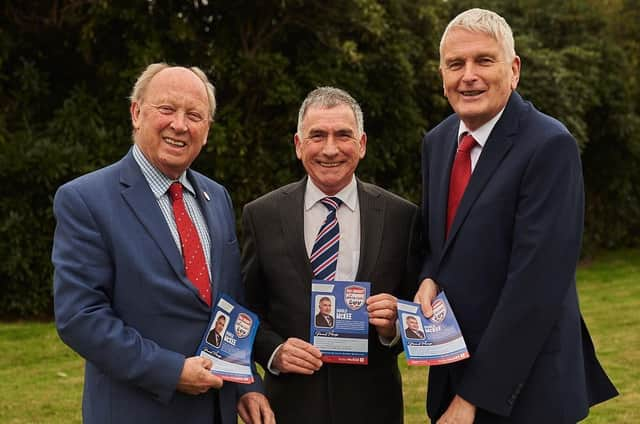Ben Lowry: There should be room for unionists who are firm on core matters but also liberal on others


Jim Allister quit the DUP in 2007 after it went into power-sharing with Sinn Fein. In the following 15 years, no-one of note within the DUP followed suit.
Meanwhile, unionism has been put under pressure to make relentless, significant concessions.
Advertisement
Hide AdAdvertisement
Hide AdMr Wells has endorsed Harold McKee, who is the TUV candidate in South Down. While Mr Allister, Mr Wells and Mr McKee are undoubtedly traditional unionists they have a varied background.
Mr Allister was out of politics from the late 1980s until 2004, and immersed in a legal career as a QC.
Mr McKee is a former Ulster Unionist.
And Mr Wells, while his background is a conventional one for a supporter of the late Rev Ian Paisley (whose party he joined in the 1970s), including being a evangelical Christian, he also has views that were much less common in the DUP.
He has a deep knowledge of health issues and understood early the need for NHS reform (although critics would say he failed to advance such reform as health minister), which set him apart from many populist politicians.
Advertisement
Hide AdAdvertisement
Hide AdHe also has a passionate interest in the environment. It is almost 20 years since I first reported Mr Wells’s views on the need for tighter planning control in the Ulster countryside (where there has long been a policy that is tolerant of bungalows and other single dwellings). This was, again, an unusual stance in DUP.
Yet a striking aspect of this week’s revelation that Mr Wells was abandoning the DUP in South Down, a constituency that he represented at Stormont for 27 years, was that he and Mr McKee both emphasised their shared conservative social values.
This is unsurprising in a way given that it is — again — striking that there has not been more of a backlash against the move towards hyper liberalism on issues such as abortion and trans issues. Public opinions and policies on such matters have changed with great speed.
NI has moved, for example, from a strict ban on terminations to a lenient policy of abortion on demand for any reason, within first third of a pregnancy.
Advertisement
Hide AdAdvertisement
Hide AdFor all the change in social issues, hundreds of thousands of people in the province are still horrified by a liberal abortion regime so there should be political capital to be had from adopting more conservative stance.
In the 1980s some of the most socially conservative politicians were nationalists such as Seamus Mallon. Traditional Catholics have been abandoned by modern Irish nationalism and republicanism.
But there is a problem for unionism if only it is associated with traditional conservative stances on social issues. What about the many people who are moderate on such matters but firm on issues pertaining to the Union?
Unionism is now under relentless pressure to make many low-level concessions to nationalism. This indeed seems to be part of the republican strategy.
Advertisement
Hide AdAdvertisement
Hide AdAlmost everything is now contested, such as the assumption that sovereignty has consequences, eg a dominant position for the symbolism of the state to which we belong (the UK).
In the last decade we have seen numerous concessions that work against unionism. These include on legacy of the Troubles, and the way that investigations have turned against the state (while no real progress is made into IRA terror).
Or the discarding of the crucial three strands in the 2020 New Decade New Approach deal.
Or an increasing failure to understand that NI has a right to be different from the Republic (so that the Irish two-state solution means we should be able to opt out of giving the Irish language the prominence it gets south of the border).
Advertisement
Hide AdAdvertisement
Hide AdOr the way that it was conceded that a political party that wants Northern Ireland to fail can collapse Stormont until it gets a contested, and long cherished, political aim.
Or the informal concession that the UK military can only be deployed in humanitarian roles in NI if it has local approval.
Or the gradually contested idea that BBC NI is part of a UK national broadcaster which, after covering local NI news, will give primacy to rest of UK news.
Or the extraordinary abandonment of the assumption that internal UK trade should get precedence of movement over internal EU trade.
Advertisement
Hide AdAdvertisement
Hide AdIt has never become more important that there are unionists to defend these core principles.
Yet sometimes the quest for ‘liberal’ unionism falls into confusion and is interpreted as meaning that progressive unionists, as well as being socially liberal, will be soft on core matters of defending a Union that is under constant assault.
• Ben Lowry (@BenLowry2) is News Letter editor
• Ben Lowry: Boris Johnson is under-estimated by his enemies
• Ben Lowry last week: Even if Article 16 is not triggered London knows that the NI Protocol is a huge problem
Advertisement
Hide AdAdvertisement
Hide Ad• Ben Lowry April 2: Three things to look out for in the coming election
Other letters and opinion pieces: